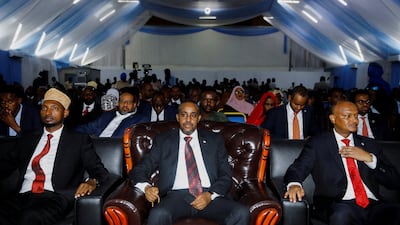Somalia edged closer to holding a delayed presidential election after the lower house parliament elected a speaker in a drawn-out process that concluded in the early hours of Thursday.
The presidential election is more than a year behind schedule, with the process marred by deadly violence and a power struggle between the current president, Mohamed Abdullahi Mohamed, and Prime Minister Mohamed Hussein Roble.
Veteran politician Sheikh Adan Mohamed Nur, better known as Sheikh Adan Madobe, was elected lower house speaker after a tense standoff between African Union peacekeepers and police loyal to the president who tried to turn away MPs from the airport hangar where the vote was to be held. Mr Roble had asked the peacekeepers to secure the venue to ensure the parliamentarians could enter.
Mr Madobe, 66, secured 163 votes out of the 252 ballots cast after two rounds of voting. He previously served as speaker between 2007 and 2010 and is not known to be allied with either the president or the prime minister.
The president congratulated Mr Madobe, saying that he hoped his election “becomes a starting point for a greater change that saves the country".
On Tuesday, Abdi Hashi Abdullahi, 76, was re-elected as speaker of the upper house. Parliament will now set a date for the presidential vote.
The presidential election in Somalia follows an indirect model, whereby state legislatures and clan delegates pick the members of parliament, who in turn choose the president.
Somalia was meant to elect a new president last year, but failed to do so before Mr Mohamed's mandate expired in February 2021.
He tried to extend his rule by decree, sparking street battles in Mogadishu.
Under pressure from the international community, he appointed Mr Roble in September to seek consensus on a way forward. But their disagreements have hindered progress and stoked fears of further instability in the country, which is already battling the Al Shabaab militant group and the threat of famine.
A crucial three-year IMF $400 million financial assistance package for Somalia will automatically expire in mid-May if a new administration is not in place to endorse planned reforms.
On Wednesday, Somalia's international backers warned that “political tensions and security incidents must not be permitted to disrupt final stages” of the election.
“We urge all Somali leaders to exercise restraint, resolve differences through compromise, and avoid escalation of any incidents.”
They have also warned that the chaos distracts from the fight against Al Shabaab.
The Al Qaeda-linked militants frequently attack civilian, military and government targets in the capital Mogadishu and elsewhere in the country.
The extremists controlled Mogadishu until 2011, when they were pushed out by an African Union force, but they still hold territory in the countryside.

